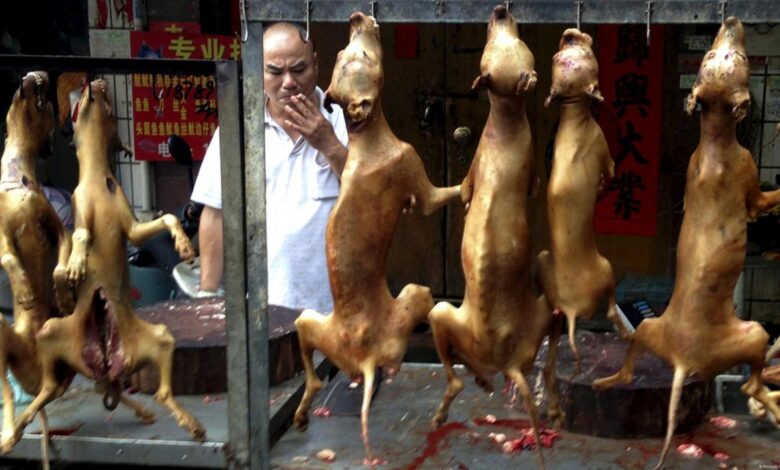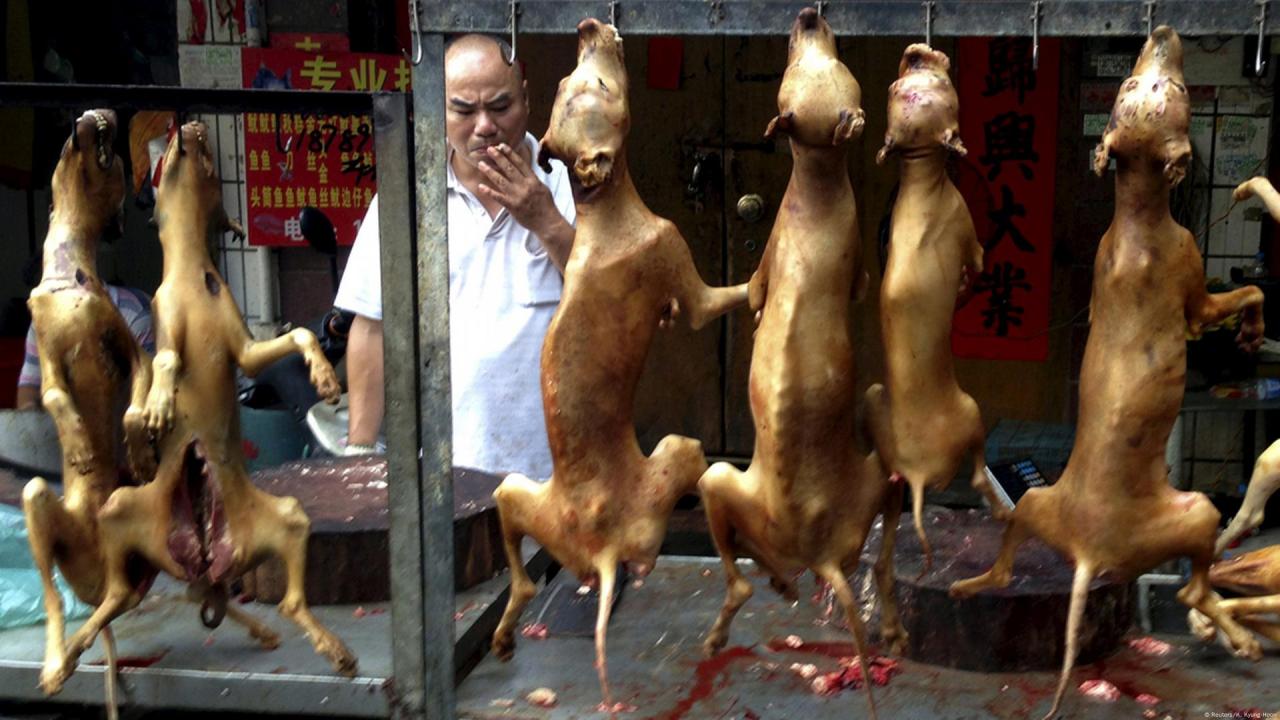
South Korea Dog Meat Ban A Cultural Shift
South Korea dog meat ban has ignited a complex debate, challenging deeply rooted traditions and raising profound ethical questions. From historical contexts to the implementation of the ban, and its diverse impacts on society, this blog delves into the multifaceted story of this controversial issue.
This post explores the historical context of dog meat consumption in South Korea, examining its cultural significance and the social and economic factors that contributed to this tradition. It then analyzes the movement to ban dog meat, including the arguments and strategies used by proponents of the ban. The implementation of the ban, public reaction, ethical considerations, and international perspectives are also explored.
Historical Context of Dog Meat Consumption in South Korea
Dog meat consumption in South Korea, a deeply entrenched practice for centuries, has undergone a complex evolution, reflecting shifting social norms, economic realities, and evolving public opinion. The tradition’s historical roots are intertwined with the country’s agricultural practices and societal structures, leading to a multifaceted understanding of its prevalence and significance across different eras. Today, the debate surrounding this practice is intensely polarized, highlighting the historical complexities that have shaped the nation’s perspective on this issue.The historical prevalence of dog meat consumption in South Korea has been a significant aspect of the country’s culinary traditions.
It wasn’t a simple practice, but rather one deeply rooted in societal structures and economic conditions, evolving throughout different periods. The tradition’s significance has varied, influenced by social and economic forces, and consequently, public opinion has evolved over time.
Historical Overview of Dog Meat Consumption
The consumption of dog meat in Korea dates back to ancient times, with evidence suggesting its presence in various historical records and cultural practices. Early agricultural societies likely relied on dogs for various tasks, including hunting and herding, and their consumption may have been a consequence of resource management or survival strategies. Over time, however, the practice became more integrated into the broader culinary landscape.
South Korea’s recent dog meat ban highlights the complex ethical debates surrounding food choices. While this ban reflects a growing global awareness of animal welfare, it’s interesting to consider the contrasting political landscape. For example, the Biden administration’s veto of the Republican’s electric vehicle charging bill ( biden veto republican electric vehicle charging ) shows the ongoing struggle for consensus on important policy issues.
Ultimately, the dog meat ban in South Korea remains a significant cultural and ethical discussion, showcasing a world grappling with various perspectives on animal consumption.
Social and Economic Factors Contributing to the Tradition
Several social and economic factors contributed to the prevalence of dog meat consumption. In rural areas, dogs were often seen as a source of protein, especially during times of scarcity. The relatively low cost of dogs compared to other livestock made them an accessible and affordable source of meat. The societal structures of the time, particularly the hierarchical divisions between social classes, also played a role.
Furthermore, the tradition was influenced by the agricultural practices and the need to manage animal populations.
Evolution of Public Opinion Regarding Dog Meat Consumption
Public opinion surrounding dog meat consumption has undergone a significant shift. Early views, largely shaped by practical necessities and cultural norms, gradually gave way to changing perspectives. The rise of animal rights activism and increasing awareness of animal welfare have contributed to a growing segment of the population opposing the practice. This shift has been mirrored by the growth of the pet ownership culture, fostering a growing sense of empathy and attachment toward dogs.
Comparison of Historical Views on Dog Meat Consumption Across Social Classes
| Social Class | Historical View on Dog Meat Consumption |
|---|---|
| Rural Peasants | Dog meat was often a crucial source of protein and a practical means of resource management, especially during times of scarcity. |
| Urban Merchants | Dog meat consumption was prevalent but perhaps less reliant on it as a primary protein source due to greater economic access to other meats. |
| Aristocracy/Elite | Consumption of dog meat may have varied among the elite, potentially driven by traditions and cultural norms, but less driven by economic necessity. |
The table illustrates the varying perspectives on dog meat consumption across different social classes in South Korea throughout history. The factors influencing consumption patterns differed depending on the social class, reflecting the complex interplay between economic needs, cultural practices, and societal structures.
The Movement to Ban Dog Meat in South Korea
The long-standing practice of consuming dog meat in South Korea has been a source of intense debate, particularly in recent years. The cultural significance of dog meat, deeply rooted in historical traditions, is intertwined with the burgeoning animal rights movement and evolving societal values. This complex interplay has fueled a powerful movement advocating for a complete ban on the practice.The movement to ban dog meat in South Korea is not a recent phenomenon, but rather a gradual shift in public opinion and activism.
Driven by a confluence of ethical, health, and cultural concerns, the campaign has employed various strategies to gain traction and ultimately influence policy. This article delves into the key events, individuals, and arguments that have propelled the movement toward a ban.
Key Figures and Initial Protests
The modern movement to ban dog meat in South Korea was sparked by the growing awareness of animal welfare issues. Several individuals and organizations played crucial roles in initiating and sustaining the campaign. These activists, often from animal rights groups and social media influencers, began organizing protests and raising awareness about the ethical implications of dog meat consumption.
Early efforts focused on public demonstrations and disseminating information through social media platforms, gradually attracting wider attention and support.
Ethical Arguments for the Ban
Proponents of the ban often emphasized the inherent rights of animals. They argued that dogs, like other sentient beings, deserve respect and protection from exploitation. The ethical arguments frequently cited the inhumane conditions under which dogs are often raised and transported for slaughter. Furthermore, proponents highlighted the emotional bond many people share with dogs, contrasting this connection with the practice of consuming them.
Health Concerns and Evidence
Beyond ethical concerns, proponents also raised significant health concerns. The potential risks associated with consuming dog meat, including the spread of zoonotic diseases, were highlighted in various publications and public forums. Research and scientific studies provided evidence supporting these concerns, emphasizing the potential for harmful pathogens and bacteria to be transmitted from animals to humans. This evidence was crucial in building a case for the health risks associated with dog meat consumption.
Raising Awareness and Garnering Support
Various strategies were employed to raise awareness and garner support for the ban. Public awareness campaigns were launched, utilizing educational materials, documentaries, and online platforms to inform the public about the ethical and health concerns associated with dog meat consumption. These campaigns aimed to shift public opinion by highlighting the suffering of dogs raised for slaughter and the potential risks to human health.
Influencing Public Opinion
Proponents of the ban employed various strategies to influence public opinion against dog meat consumption. This included disseminating information about the inhumane treatment of dogs in the meat industry, showcasing compelling images and videos, and using social media to engage in dialogue and build a sense of community among supporters. These strategies helped shape public perception and generate support for the ban by leveraging emotional appeals and providing factual information.
The Implementation of the Dog Meat Ban

The journey towards a dog meat ban in South Korea wasn’t a swift one. It involved years of campaigning, public awareness campaigns, and ultimately, a complex legal process. This article delves into the specifics of the implementation, exploring the stakeholders, challenges, and the timeline leading up to and following the ban’s enactment.The dog meat ban wasn’t simply a legislative decision; it represented a significant shift in societal values and attitudes.
South Korea’s recent dog meat ban is a huge step forward for animal rights. It’s a significant shift in cultural norms, but it also raises questions about economic impacts. Considering the stark contrast, the sheer price of some homes in California, like those 2 million dollar homes california , highlights the stark wealth disparity. Ultimately, the dog meat ban reflects a growing global awareness of animal welfare, a trend hopefully mirrored in other areas of the world.
The process involved a multitude of actors, from animal rights activists to government officials and the general public, each with varying degrees of influence and interest.
The Legal Process and Steps Taken
The South Korean government, acknowledging the growing public demand for a ban and the mounting pressure from animal welfare organizations, meticulously crafted legislation. This involved drafting specific laws that addressed aspects of dog meat trade, including the breeding, sale, and consumption of dogs. The process likely included public consultations and hearings, allowing various stakeholders to present their views. Regulations regarding enforcement, penalties for violations, and transitional periods for existing businesses were also integral parts of the legal framework.
Stakeholders Involved in the Implementation
The implementation of the ban involved a diverse range of stakeholders, each playing a crucial role. Government agencies, including the Ministry of Agriculture, Food and Rural Affairs, played a pivotal role in drafting and implementing the regulations. Animal rights organizations actively lobbied for the ban, often organizing public awareness campaigns and providing crucial data to support their cause.
Veterinary professionals, involved in the welfare of animals, likely provided expert advice on animal husbandry and welfare practices. Finally, businesses in the dog meat trade, though opposing the ban, undoubtedly had a vested interest in the implementation’s impact on their operations. Their needs likely shaped the transition period and potential compensation programs.
Challenges and Obstacles Encountered
The implementation of the dog meat ban wasn’t without its challenges. The ban deeply impacted a segment of the South Korean economy, particularly the businesses involved in the dog meat trade. Transitional periods and compensation programs aimed to mitigate these impacts. The ban also faced resistance from some segments of the public who had traditional ties to the practice, presenting a cultural and societal challenge.
Furthermore, the enforcement of the ban required robust oversight and monitoring mechanisms to ensure compliance.
Timeline of Events
| Date | Event | Description |
|---|---|---|
| 2017 | Initial Legislation Proposals | Initial legislative proposals were introduced, signifying the start of the formal process. |
| 2018 | Public Awareness Campaigns | Animal rights groups and NGOs ramped up public awareness campaigns, highlighting the inhumane treatment of dogs. |
| 2019 | Amendments and Refinements | The legislation underwent multiple amendments and refinements based on public feedback and expert consultations. |
| 2020 | Final Legislation Enactment | The dog meat ban legislation was formally enacted, marking a crucial turning point. |
| 2021 | Transitional Periods | Transitional periods were established for businesses in the dog meat trade to adjust to the new regulations. |
| 2022 | Enforcement and Monitoring | Government agencies began enforcing the ban and implementing monitoring systems to ensure compliance. |
| 2023 | Ongoing Monitoring and Adjustments | Ongoing monitoring and adjustments to the ban are necessary to ensure its effective implementation and address any emerging challenges. |
Public Reaction and Impact of the Ban
The South Korean dog meat ban, a landmark moment in animal rights activism, ignited a complex tapestry of public reactions. The decision, while lauded by animal welfare advocates, stirred significant debate, reflecting deeply held cultural and economic considerations. Diverse opinions, ranging from passionate support to staunch opposition, shaped the landscape of public discourse surrounding the ban.The ban’s implementation presented a unique challenge in balancing societal values and economic realities.
It underscored the complexities of navigating cultural traditions with evolving ethical norms, highlighting the potential for both positive and negative consequences. Understanding these multifaceted reactions, particularly the contrasting experiences in urban and rural areas, is crucial to comprehending the long-term impact of this significant policy change.
Public Perspectives on the Ban
The public response to the ban exhibited a spectrum of viewpoints. Proponents of the ban emphasized the inherent cruelty of the practice and highlighted the growing global awareness of animal welfare. Conversely, opponents often viewed the practice as a long-standing cultural tradition, and argued for the economic viability of the dog meat industry. These contrasting perspectives, deeply rooted in differing cultural values and economic realities, underscore the social and economic complexities of the ban.
Urban vs. Rural Reactions
Public reactions differed significantly between urban and rural areas. Urban dwellers, generally more exposed to global animal welfare movements and progressive ideals, often showed greater support for the ban. Rural areas, where dog meat consumption is more prevalent and often integral to local economies, frequently voiced concerns about the economic ramifications of the ban. This disparity underscores the uneven impact of the ban across different segments of South Korean society.
Economic Impact of the Ban
The ban’s implementation inevitably led to significant economic shifts within the dog meat industry. Dog meat markets, slaughterhouses, and associated businesses faced immediate and substantial disruption. The economic repercussions extended beyond these direct players, affecting related businesses such as transportation and supply chains. Analyzing these economic consequences reveals the importance of considering the long-term adjustments and supporting measures necessary to mitigate potential hardship.
Economic Adjustments Post-Ban
| Industry Sector | Impact of the Ban | Adjustments Made |
|---|---|---|
| Dog Meat Slaughterhouses | Closure or conversion to alternative businesses (e.g., pet food, livestock). | Reskilling programs for workers, financial assistance for business owners. |
| Dog Meat Vendors | Loss of income, decreased market demand. | Transition to other food service jobs, government subsidies, retraining opportunities. |
| Pet Food Industry | Increased demand for pet food products. | Expansion of production facilities, development of new pet food products. |
| Livestock Farming | Potential increase in demand for livestock products. | Adaptation to meet the growing demand for alternative protein sources. |
The table above illustrates the economic shifts following the dog meat ban, demonstrating how different industries responded to the change in policy. The transition was not seamless, requiring substantial adjustments and support measures to mitigate potential negative consequences. The implementation of the ban, coupled with the proactive responses of the South Korean government, provides a case study in how economic disruption can be managed during societal transitions.
Ethical Considerations Surrounding the Ban
The South Korean dog meat ban has sparked a complex debate, not just about culinary preferences but also about animal welfare, cultural traditions, and ethical treatment of animals across diverse societies. The ban’s implementation highlights the multifaceted nature of ethical considerations when human practices clash with animal rights. Different perspectives on the value of animals and the acceptability of consumption vary significantly, leading to both support and opposition to the measure.The ethical arguments surrounding the dog meat ban in South Korea are deeply rooted in differing perspectives on animal rights, cultural norms, and religious beliefs.
Examining these diverse viewpoints is crucial to understanding the multifaceted nature of the debate.
Arguments For the Ban from Animal Rights Perspectives
The animal rights movement champions the inherent value and rights of animals, arguing that all sentient beings deserve consideration and protection. From this perspective, the consumption of dog meat is unethical due to the inherent suffering inflicted upon the animals during their lives and ultimately at the time of slaughter. The process often involves confinement, transport, and inhumane slaughter practices.
This view holds that animals should not be subjected to practices that cause unnecessary pain and suffering, regardless of cultural or traditional practices.
South Korea’s recent dog meat ban is a fascinating ethical debate, isn’t it? It raises questions about cultural norms and animal rights. Interestingly, the complexities surrounding this issue mirror the high-stakes world of art fraud, like in the Rybolovlev vs. Sotheby’s case, rybolovlev sothebys art fraud trial , where the intricate web of deceit and money underscores the power of societal pressures and the blurred lines between truth and falsehood.
Ultimately, both situations highlight how deeply ingrained traditions and values can clash with evolving ethical standards, prompting us to think about our own consumption habits and societal norms.
Cultural and Religious Implications of the Ban
The ban has profound implications for South Korean society, touching upon deeply ingrained cultural traditions. For many, dog meat consumption is an integral part of their cultural heritage, passed down through generations. The ban, therefore, challenges established social norms and customs, leading to resistance and resentment from those who view it as a violation of their cultural identity.
It also has significant implications for the livelihoods of individuals involved in the dog meat trade.
Comparison of Ethical Viewpoints on Dog Meat Consumption Across Cultures
The consumption of dog meat is a contentious issue across various cultures. While widely practiced in some regions, it’s considered barbaric and cruel in many others. This divergence highlights the diversity of ethical perspectives on animal consumption and the lack of universal agreement on animal treatment. Cultural norms, religious beliefs, and historical contexts all play significant roles in shaping attitudes toward animals and their consumption.
For example, in some cultures, dogs are considered working animals, and their consumption is seen as a practical way to utilize resources.
Different Perspectives on the Treatment of Animals in South Korea
Diverse perspectives on animal treatment in South Korea are present. Some view dogs as mere commodities to be exploited for economic gain, while others advocate for their protection and welfare. There’s a significant divide between those who uphold traditional practices and those who advocate for modern animal welfare standards. This contrasts with the perspectives in other cultures, where animals might be considered companions or members of the family.
This difference in treatment reflects differing societal values and norms surrounding animals.
International Perspectives on the South Korean Dog Meat Ban
The South Korean dog meat ban, a significant shift in societal norms and animal welfare, has resonated globally. This action sparked considerable international discussion, prompting diverse reactions and analyses from various countries with differing cultural and historical perspectives on animal consumption. The ban’s impact extends beyond South Korea’s borders, influencing discussions about animal rights, cultural sensitivity, and the evolving global landscape of animal welfare.The international community’s response to the South Korean dog meat ban varied greatly.
South Korea’s recent dog meat ban is a fascinating example of evolving cultural norms. While this decision is a huge step forward for animal welfare, it’s interesting to consider the broader context of similar debates and conflicts around the world. For instance, the ongoing tensions in the Middle East, particularly concerning Iran’s role in regional conflicts, iran conflictos medio oriente , highlight the complexities of cultural and political landscapes that can influence such decisions.
Ultimately, the dog meat ban in South Korea serves as a powerful example of how societal values can shift and impact animal rights on a global scale.
While some nations supported the ban, others expressed concerns about cultural preservation and the potential economic implications for communities reliant on dog meat consumption. The ban’s success in raising global awareness about animal welfare issues and prompting discussions about ethical consumption practices is undeniable.
Reactions from Animal Rights Organizations
Animal rights organizations worldwide have overwhelmingly supported the South Korean ban. They viewed the ban as a crucial step towards reducing animal cruelty and recognizing the inherent value of all sentient beings. Organizations like PETA and the Humane Society International praised the decision, emphasizing the ethical implications of consuming animals raised for food. Their advocacy has played a significant role in influencing public opinion and policy decisions in various countries.
Perspectives of Countries with Similar Traditions
Several countries have traditions similar to South Korea’s regarding dog meat consumption. These countries often face similar challenges in navigating cultural norms with evolving animal welfare concerns. For example, some parts of China and Vietnam have long-standing traditions of dog meat consumption, leading to complex debates about cultural preservation versus animal welfare. The South Korean ban has contributed to these dialogues, raising awareness and encouraging critical examination of these traditions in the context of modern ethical standards.
South Korea’s recent dog meat ban is a fascinating example of societal shifts. While the ban highlights a growing global concern for animal welfare, it’s interesting to consider how these shifts might impact similar cultural practices elsewhere. Meanwhile, television’s biggest night, the Emmy Awards, saw some impressive ratings, though it’s unclear if the cultural shifts surrounding the dog meat ban had any correlation.
To see the Emmy awards tv ratings and how they have changed over time, check out this article: emmy awards tv ratings. Ultimately, the dog meat ban reflects a changing attitude toward animals, and it’s a topic worthy of further exploration.
Perspectives of Countries with Different Traditions
Conversely, many countries have vastly different traditions regarding animal consumption. Countries that prioritize animal welfare and have stringent regulations on animal agriculture tend to view the South Korean ban positively, aligning with their ethical frameworks. The diverse reactions across countries highlight the complex interplay between cultural norms, economic factors, and evolving global standards for animal welfare.
Comparison of Approaches to Animal Welfare and Consumption
| Country | Approach to Animal Welfare | Approach to Animal Consumption | Dog Meat Consumption Status |
|---|---|---|---|
| South Korea | Shifting towards stronger regulations and ethical considerations. | Historically accepted but now facing strong opposition and a ban. | Banned |
| China | Varying regulations and practices across regions. | Traditional consumption, with differing opinions and debates. | Consumption continues, with varying local practices. |
| United States | Strong emphasis on animal welfare and humane treatment. | Generally accepts animal agriculture but with growing ethical concerns. | Dog meat consumption is rare and considered highly unusual. |
| India | Diverse views and traditions; strong religious and cultural factors. | Significant restrictions on meat consumption in certain religious communities. | Rare and culturally insignificant. |
The table illustrates the wide range of approaches across nations concerning animal welfare and consumption. The differences highlight the global diversity in addressing animal issues and the ongoing debate about the ethical and cultural implications of animal agriculture. These varying perspectives highlight the importance of respecting cultural nuances while promoting ethical treatment of animals.
The Future of Dog Meat Consumption in South Korea

The South Korean dog meat ban, a landmark decision with profound implications, has irrevocably altered the nation’s culinary landscape. While the debate surrounding this practice is far from over, understanding the potential future of dog meat consumption, the long-term cultural impact, and alternative economic avenues is crucial.The ban signifies a significant shift in societal values and attitudes towards animal welfare.
Its long-term effects on South Korean culture, economy, and international relations will be complex and multifaceted. This shift will affect not only the dog meat industry but also related sectors, demanding careful consideration of sustainable and ethical alternatives.
Potential Future of Dog Meat Consumption
The dog meat industry in South Korea is unlikely to return to its former prominence. The ban has effectively removed a key market for dog meat, and the social stigma associated with it will likely persist. While isolated instances of consumption may still occur, the overall trend points towards a decline in the practice. Enforcement of the ban, coupled with public awareness campaigns, will continue to influence the likelihood of dog meat consumption.
Long-Term Effects on South Korean Culture
The ban’s impact on South Korean culture will be profound. Traditional practices and cultural norms related to dog meat consumption are gradually fading, replaced by a growing emphasis on animal welfare and ethical considerations. This shift reflects a broader societal evolution toward more compassionate values, impacting social gatherings, festivals, and potentially traditional recipes. The cultural significance of the dog meat industry, historically linked to certain social and economic contexts, is undergoing a substantial transformation.
Alternative Economic Activities, South korea dog meat ban
The dog meat industry, while significant in some regions, has always represented a small part of the South Korean economy. The potential for alternative economic activities to replace the dog meat industry is substantial. The livestock and animal husbandry sector, including the breeding and care of companion animals, is an immediate opportunity. Further diversification into areas like tourism, agricultural innovation, and the development of pet food industries could create substantial employment opportunities and contribute to a sustainable economy.
Sustainable and Ethical Animal Husbandry Practices
The dog meat ban presents an opportunity to promote sustainable and ethical animal husbandry practices. Focusing on the humane treatment of animals in the livestock sector and companion animal industries can create a more compassionate and sustainable agricultural model. South Korea can lead the way in developing innovative solutions for animal welfare, setting a benchmark for other countries grappling with similar issues.
This will include responsible breeding practices, appropriate animal care standards, and innovative solutions for waste management.
Illustrative examples of cultural impacts: South Korea Dog Meat Ban

The South Korean dog meat ban, a relatively recent development, has undeniably impacted deeply entrenched cultural traditions and social practices. While the consumption of dog meat has a long history, the ban has forced a reevaluation of this practice and its place within Korean society. This shift is evident in the changing relationship between humans and animals, festival celebrations, and even daily routines.
The cultural impact extends beyond simple dietary choices, affecting the fabric of Korean identity and social interactions.
A Traditional Korean Festival Related to Dog Meat Consumption
The historical context of dog meat consumption is often intertwined with specific festivals. One such example is the traditional Dog Meat Festival, a celebration often held in rural areas. These festivals, usually in the past, marked significant agricultural events, often tied to the harvest or the start of winter. Historically, dog meat was considered a significant source of protein and sustenance, particularly during lean periods.
The festival often included communal gatherings, feasting, and the sharing of dog meat, embodying a community spirit.
Impact of the Ban on Cultural Traditions and Social Practices
The ban has significantly altered the Dog Meat Festival, rendering its traditional practices untenable. The absence of dog meat from the festival celebrations has prompted adaptations and alternative food options. Communities have sought to replace the traditional elements with new customs and traditions. This adaptation highlights the dynamic nature of cultural traditions, capable of evolving and transforming to accommodate societal shifts.
The festival has adapted and now focuses on other aspects, like agriculture or community building, while the consumption of dog meat is no longer central.
Impact on Daily Lives of People in South Korea
The ban’s impact extends beyond festivals. Lives of people who previously relied on dog meat as a part of their diet have been affected. There are reports of difficulties in adjusting to alternative protein sources, especially in rural communities where dog meat may have been a more readily available and affordable option. The impact varies depending on income levels, with those with limited resources facing greater challenges.
Real-life stories of people having to adapt their diets and find new sources of protein, often more expensive, provide a glimpse into the challenges associated with the ban.
Changing Relationship Between Humans and Animals in South Korea
The dog meat ban reflects a changing relationship between humans and animals in South Korea. There is an increasing recognition of animal welfare and rights. This is evident in the growing popularity of pet ownership and the establishment of animal shelters. Cultural shifts toward a more compassionate view of animals are demonstrably present. The ban has further strengthened this trend, with more people adopting a stance against the consumption of dog meat, reflecting a broader societal shift in ethical considerations regarding animals.
Conclusive Thoughts
The South Korea dog meat ban, a significant turning point in the country’s relationship with animals, presents a complex tapestry of cultural, social, and economic shifts. While the ban has undoubtedly brought about changes, its long-term implications and the evolving cultural landscape remain to be seen. The discussion surrounding this issue underscores the importance of considering diverse perspectives and the need for thoughtful dialogue in addressing such sensitive topics.
FAQ Guide
What are the key arguments used by proponents of the dog meat ban?
Proponents often cite ethical concerns regarding animal welfare, highlighting the inhumane treatment of dogs in the industry. Health concerns related to potential zoonotic diseases are also frequently raised.
How has the ban affected rural communities in South Korea?
Rural communities, often more reliant on the dog meat industry, have faced significant economic hardship due to the ban. Finding alternative livelihoods and adapting to the changing economic landscape has proven challenging for some.
What are some potential alternative economic activities to replace the dog meat industry?
Potential alternatives include tourism focused on cultural preservation, and the development of sustainable agriculture and animal husbandry practices. Diversification of local economies is crucial to mitigating the impact of the ban.
What are the cultural implications of the ban on South Korean society?
The ban has disrupted traditional cultural practices and social norms, particularly in rural communities where dog meat consumption has long been part of the cultural identity. Adjusting to these changes and finding ways to preserve cultural heritage are vital.






